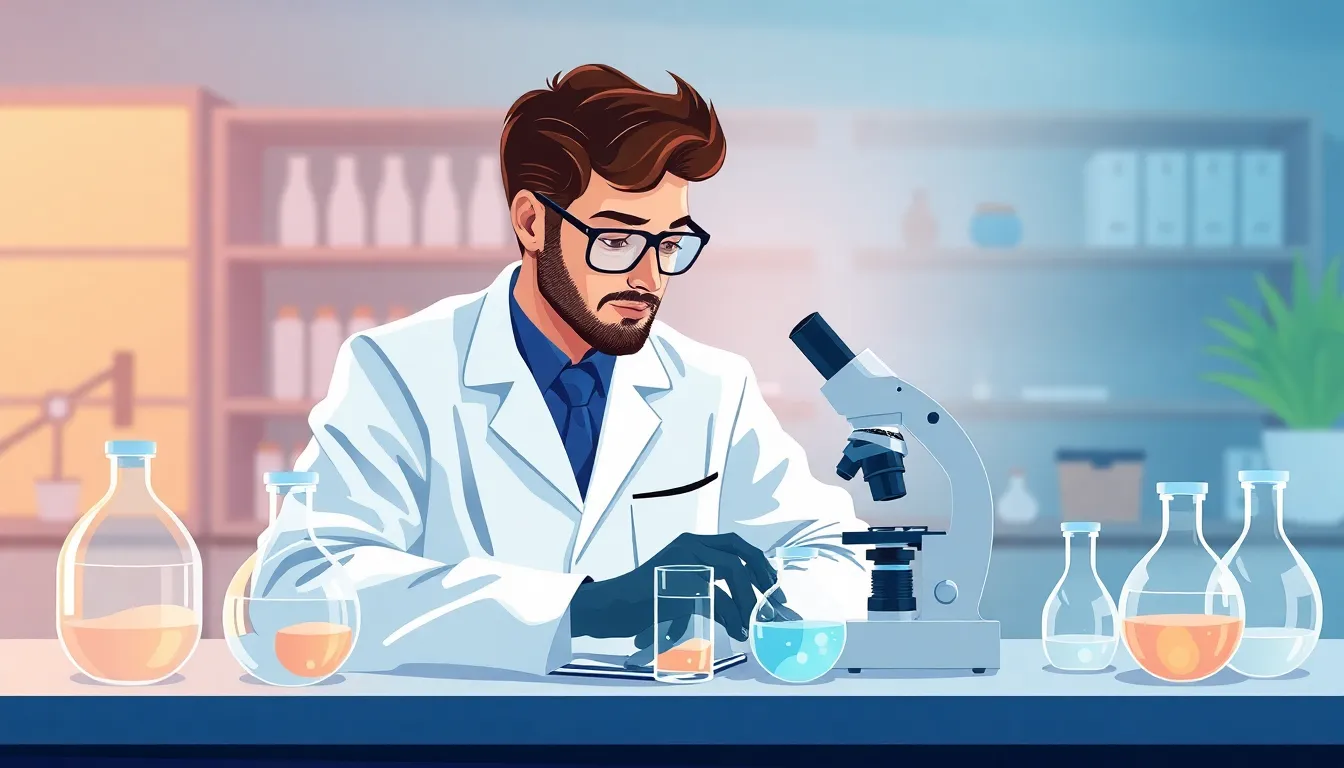Science has a knack for surprising us, often in the most unexpected ways. From the moment Galileo dropped his balls from the Leaning Tower of Pisa to the latest breakthroughs in quantum physics, the journey of discovery has been nothing short of a wild ride. It’s like humanity’s own version of a cosmic game show, where the prize is knowledge and the rules are constantly changing.
Every time a scientist cracks a code or unveils a new theory, they add another layer to our understanding of the universe. Whether it’s unraveling the mysteries of black holes or inventing gadgets that would make even James Bond jealous, these discoveries shape our world in ways we often take for granted. So buckle up as we dive into some of the most mind-boggling science discoveries that have left us scratching our heads and laughing in awe.
Overview of World Science Discoveries
Scientific discoveries shape understanding of the universe and humanity’s role within it. Major breakthroughs occur in various fields, including physics, biology, and technology. Discoveries like the theory of relativity revolutionized physics, altering perceptions of space and time. In genetics, the structure of DNA uncovered the blueprint of life, leading to advancements in medicine and biotechnology.
Quantum mechanics introduced a new realm of physics, revealing the behavior of matter at microscopic levels. Black holes emerged as fascinating entities, challenging traditional concepts of gravity and cosmic events. The discovery of penicillin marked the beginning of antibiotics, dramatically influencing healthcare and increasing life expectancies.
Innovations in technology stem from scientific exploration. The invention of the internet transformed communication and information sharing globally. Renewable energy technologies offer sustainable solutions to combat climate change. Vaccine development against diseases like polio and COVID-19 exemplifies science’s impact on public health.
Artificial intelligence demonstrates the fusion of computer science and engineering, providing enhanced solutions to complex problems. Space exploration, highlighted by the Hubble Space Telescope, deepens knowledge of the universe, revealing galaxies, stars, and planets previously unseen.
Each of these discoveries contributes to humanity’s ongoing quest for knowledge, revealing both the wonders of science and its profound implications. Scientific understanding continually evolves, driven by new research and technological advancements. The journey of discovery inspires a commitment to further exploration, enabling innovations that improve lives and expand horizons.
Historical Milestones in Science

Scientific achievements throughout history reveal humanity’s quest for understanding. Notable breakthroughs paved the way for advancements across various fields.
Ancient Discoveries
Ancient civilizations contributed significantly to science through observations and innovations. The Egyptians excelled in mathematics and engineering, exemplified by the construction of the pyramids. The Greeks introduced foundational concepts in biology, with Hippocrates fostering early medical ethics. Archimedes’ principles of leverage and buoyancy influenced physics and engineering for centuries. Chinese inventions like papermaking and gunpowder transformed communication and warfare. Essential discoveries of this period laid the groundwork for future explorations and theories.
The Renaissance and Scientific Revolution
The Renaissance marked a radical shift in scientific thinking. Figures like Copernicus challenged geocentric models, proposing heliocentric theories that reshaped astronomy. Galileo’s meticulous experiments established the scientific method, emphasizing observation and evidence. Kepler’s laws of planetary motion provided mathematical support to Copernicus’ ideas, advancing our understanding of celestial mechanics. Newton’s laws of motion and universal gravitation unified physics, offering a cohesive framework for understanding forces. These revolutions in thought laid the foundation for modern science, driving further inquiry and innovation.
Major Modern Discoveries
The modern era showcases incredible scientific breakthroughs, reshaping our understanding of the universe and life itself. Significant developments emerge from various fields, particularly in physics and biology.
Breakthroughs in Physics
Quantum mechanics transformed physics, explaining the behavior of matter on a subatomic level. Researchers discovered entanglement, a phenomenon where particles become interconnected regardless of distance. The advancement of the Standard Model provided a framework for understanding fundamental particles and forces. Gravitational waves, first detected in 2015, confirmed predictions made a century earlier by Einstein. Accelerators like the Large Hadron Collider allowed scientists to explore conditions similar to those just after the Big Bang. These discoveries offer profound insights into the nature of reality and continue to inspire research.
Advances in Biology
The mapping of the human genome marked a significant milestone in biology, revealing the genetic blueprint for human life. CRISPR technology allows precise editing of genes, opening avenues for medical treatments and agricultural advancements. Immunotherapy revolutionized cancer treatment, harnessing the immune system to target tumors more effectively. The discovery of various microRNAs showed how gene expression regulation is vital for cell function. Stem cell research holds potential for regenerative medicine, aiming to repair damaged tissues. These biological discoveries are shaping medical practices and enhancing our understanding of life at the cellular level.
Impact of World Science Discoveries
World science discoveries significantly alter the technological landscape and societal structures. Their influence extends across various domains, shaping everyday life.
Influence on Technology
Innovations emerge from scientific breakthroughs, leading to transformative technologies. Examples include the development of the internet, which revolutionized communication and information access. Advancements in renewable energy technologies provide solutions to combat climate change, enhancing sustainability. Medical technologies, such as MRI machines, improve diagnostic capabilities, paving the way for better healthcare. Artificial intelligence applications streamline numerous processes, increasing efficiency across sectors. Each advancement creates new opportunities, fostering further exploration and innovation.
Societal Changes
Scientific advancements result in profound societal shifts. For instance, the discovery of antibiotics like penicillin significantly improved public health and increased life expectancy. Breakthroughs in genetic research influence ethical discussions regarding cloning and gene editing, shaping public policy. The advent of smartphones has transformed social interactions, affecting communication norms and lifestyle choices. Space exploration ignites curiosity about the universe, encouraging a global dialogue on humanity’s potential. These changes highlight the interconnectedness of scientific progress and societal evolution, driving cultural and economic development worldwide.
Future of Scientific Discoveries
Anticipated advancements in scientific research promise to redefine humanity’s understanding of various fields. Artificial intelligence plays a central role in this evolution, enabling breakthroughs in data analysis and discovery processes. Innovations in machine learning algorithms drive efficiency, allowing researchers to unearth patterns within complex datasets. Space exploration, propelled by renewed interest in Mars and beyond, invites possibilities of extraterrestrial life and resource utilization.
Innovative technologies, such as quantum computing, stand on the horizon, with potential to solve problems previously deemed insurmountable. With faster processing speeds, these computers could enhance simulations of molecular interactions, accelerating drug discovery. Climate change research is set to benefit from advanced modeling techniques, guiding sustainable practices and policies.
Biomedical fields also see promising directions. Gene editing tools like CRISPR offer the potential to eradicate genetic diseases, transforming medical treatments. Research into personalized medicine tailors therapies to individual genetic profiles, increasing efficacy in treatment plans. Vaccination technologies evolve, preparing responses to emerging health threats efficiently.
Collaboration between disciplines fosters a culture of innovation. Cross-pollination of ideas among scientists, engineers, and ethicists generates solutions to complex global challenges. Enhanced communication networks bolster scientific collaboration, ensuring rapid dissemination of findings.
Ethical considerations accompany these advancements, prompting reflections on implications for society. Discussions around genetic editing enter public discourse, shaping regulations and governance. Ongoing dialogue will be vital in tackling ethical dilemmas and ensuring scientific advancements benefit all.
The future holds tremendous promise, with scientific discoveries poised to change perspectives on health, the environment, and the universe at large.
Scientific discoveries have continually reshaped humanity’s understanding of the universe and its complexities. From ancient civilizations to modern breakthroughs, each revelation has contributed to a richer knowledge base that drives innovation and inquiry. The journey of discovery is far from over; future advancements promise to unveil even more about our world and beyond.
As society embraces these scientific strides, it becomes increasingly important to consider the ethical implications and responsibilities that come with such knowledge. The interconnectedness of science and technology will undoubtedly lead to transformative changes in health, environment, and communication. With collaboration and curiosity at the forefront, the next chapter of scientific exploration is sure to inspire and challenge our perceptions of reality.






